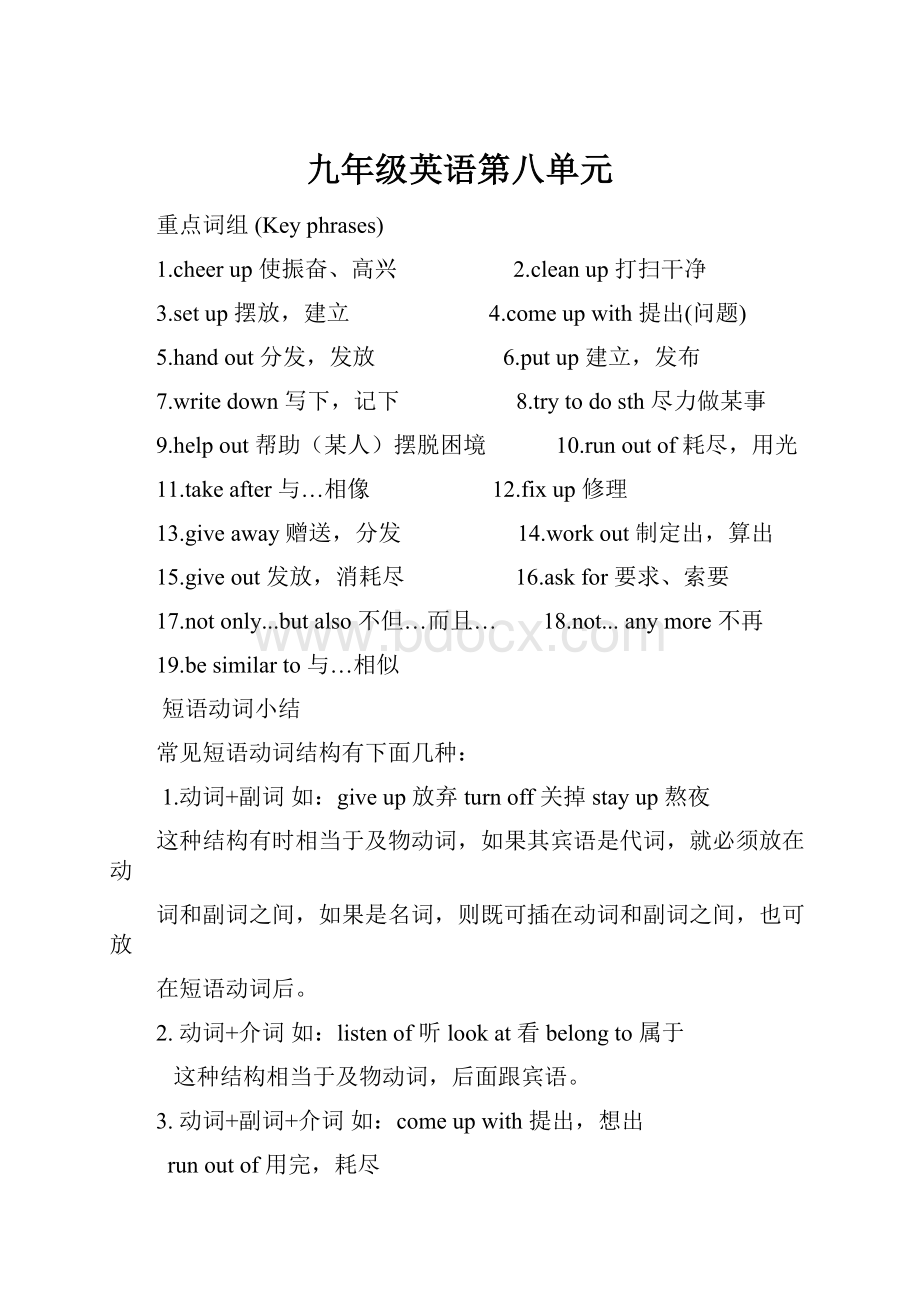九年级英语第八单元.docx
《九年级英语第八单元.docx》由会员分享,可在线阅读,更多相关《九年级英语第八单元.docx(14页珍藏版)》请在冰豆网上搜索。

九年级英语第八单元
重点词组(Keyphrases)
1.cheerup使振奋、高兴 2.cleanup打扫干净
3.setup摆放,建立 eupwith提出(问题)
5.handout分发,发放 6.putup建立,发布
7.writedown写下,记下 8.trytodosth尽力做某事
9.helpout帮助(某人)摆脱困境 10.runoutof耗尽,用光
11.takeafter与…相像 12.fixup修理
13.giveaway赠送,分发 14.workout制定出,算出
15.giveout发放,消耗尽 16.askfor要求、索要
17.notonly...butalso不但…而且… 18.not...anymore不再
19.besimilarto与…相似
短语动词小结
常见短语动词结构有下面几种:
1.动词+副词如:
giveup放弃turnoff关掉stayup熬夜
这种结构有时相当于及物动词,如果其宾语是代词,就必须放在动
词和副词之间,如果是名词,则既可插在动词和副词之间,也可放
在短语动词后。
2.动词+介词如:
listenof听lookat看belongto属于
这种结构相当于及物动词,后面跟宾语。
3.动词+副词+介词如:
comeupwith提出,想出
runoutof用完,耗尽
4.动词+名词(介词)如:
takepartin参加catchholdof抓住
1.cheer(sb.)up 使(某人)高兴、振作如:
cheermeup使我高兴
cleanup 打扫 clean-upn.打扫
2.homelessadj.无家可归的 ahomelessboy一个无家可归的男孩
home n.家
3.handout 分发 handoutbananas
giveout分发 giveoutsthtosb.分….给某人
giveupdoing放弃… giveupsmoking放弃吸烟
giveaway赠送捐赠 giveawaysth.to….giveawaymoneytokids
givesb.sth.给某人某东西 givememoney给我钱
givesth.tosb.给某人某东西givemoneytome给我线
4.sick adj.生病的 作表语、定语
ill adj.生病的 作表语,不能作定语
5.volunteertodo v.志愿效劳、主动贡献
volunteer n.志愿者
6.comeupwith 提出想出===thinkup想出
catchupwith 赶上追上
7.putoffdoing推迟做某事
puton 穿上(指过程)
putup 张贴
8.writedown写下 记下
9.callup打电话
makeatelephonecall打电话
10.setup成立建立
Thenewhospitalwassetupin2000.这座医院是在2000年成立的。
11.each每个各自的强调第一个人或事物的个别情况常与of连用
every每个每一个的一切的则有“全体”的意思不能与of连用
12.put…touse把…投入使用,利用
Theyputthenewmachinetouse.他们把新机器投入使用
13.helpsb.(to)do帮助某人做某事helphim(to)study
helpsb.withsth.帮助某人做某事helphimwithEnglish
helpdo 帮助做某事 helpstudy
14.plantodo计划做某事
plan+从句
IplantogotoBeijing.===Iplan(that)IwillgotoBeijing. 我计划去北京。
15.spend…doing花费…做…IspentadayvisitingBeijing.我花了一天的时间去参观北京。
spend…onsth. 花费…在…Ispent3yearsonEnglish.
16.notonly…but(also)…不但…而且…用来连接两个并列的成分
(1)引导以notonly…but(also)…开头的句子往往引起部分倒装。
因此⑴NotonlydoIfeelgoodbut(also)….是倒装句。
也是说得要
把前面的句子中的助动词或者是情态动词放在主语的前面。
如:
①NotonlycanIdoitbut(also)Icandobest.
我不仅能做到而且做得最好。
⑵Notonly…but(also)…接两主语时,谓语动词随后面的主语人称和数的变化也就是就近原则如:
①NotonlyLilybut(also)youlikecat.不仅莉莉而且你也喜欢猫。
②Notonlyyoubut(also)Lilylikescat.不仅你而且莉莉喜欢猫。
常见的就近原则的结构有:
Neither…nor…即不…也不…(两者都不)
NeitheryounorIlikehim.我和你都不喜欢他。
Either…or…不是…就是…(两者中的一个)
EitherLilyoryouareastudent.
Notonly…but(also)…
Therebe
17.join参加(指参加团体、组织) 如:
jointheParty入党
takepartin参加(指参加活动) 如:
takepartinsportsmeeting参加运动会
18.①runoutof==useup用完用尽
Ihaverunoutofmoney.==Ihaveusedupmoney.我已经用完了钱。
②runaway逃跑 Themonkeyhasrunawayfromthezoo.
这只猴子已经从动物园里逃跑了。
③runto+地方跑到某地
19. takeafter(在外貌、性格等方面)与(父母等)相像
besimilarto与..相像
takeafter相像
lookafter照顾
takecareof照顾
20.workout 算出 结局
Thesituationworkedoutquitewell.情况的结局非常好
Haveyouworkedoutthismathproblem?
你已经算出这道数学问题了吗?
21.hangout闲荡闲逛
Iliketohangoutatmallwithmyfriends.我喜欢和我的朋友一起去购物中心闲荡。
22.beabletodo能会
beunabletodo不能不会
23.thankyoufordoing谢谢做某事如:
thankyouforhelpingme谢谢做帮助我
24.forsure 确实如此,毫无疑问
Youdon’thavemoney.That’sforsure.你没有钱,这是毫无疑问的。
25.fill…with…使…充满… 用…填充…
Shefilledthebowlwithwater.她用水填满碗。
26.like prep.像…
27.helpsb.out帮助…做事,解决难题(摆脱困境)
Ican’tworkoutthismathproblem.Pleasehelpmeout.
我不能算出这道数学问题,请你帮我解决。
28.trainn.火车
trainv.训练
trainsb.todo.训练某人做某事
Shetrainsherdogtofetchthings.她训练她的狗去取东西。
29.atonce==rightaway立刻马上如:
Doitatonce.马上去做。
I’llgothereatonce/rightaway.我马上去那里。
30.oneday有一天(指将来/过去)
someday有一天(指将来)如:
OnedayIwenttoBeijing.有一天我去了北京。
SomedayI’llgotoBeijing.有一天我将去北京。
31.speciallyadv.特意地专门地特别地 specialadj.特别的
32.donationn.捐赠物 donatev.捐赠赠送
33.partofspeech 词性词类
34.disabledadj.肢体有残疾的 disablev.不能
疑难解析 (Keypoints)
1.Whatisafoodbank?
2.could的用法到目前为止,我们多次用到could,下面,把它的用法总结如下:
(1)could是can的过去式,意思是“能够”。
e.g.HecouldspeakEnglishwhenhewasachild.他小时候就能说英语了。
(2)用于现在时,比can更委婉,或表示虚拟语气。
e.g.CouldIhelpyou?
我能帮你做点什么?
(比CanIhelpyou?
委婉)
e.g.IfIcouldgo,Ishouldbeglad.假如我能去,那我会很高兴。
(表虚拟语气)
(3)could表示推测,意思是“大概,可能”,肯定性不大。
e.g.ThisbookcouldbeMei’s.ShestudiesFrench.这本书可能是梅的,她学法语。
(4)could用于提出建议。
e.g.---I’dliketohelpkidswiththeirschoolwork.我愿意帮孩子们复习功课。
---Youcouldvolunteerinanafter-schoolstudyprogram.你可以在课外学习班做义工。
3.NotonlydoIfeelgoodabouthelpingotherpeople,butIgettospendingtimedoingwhatI lovetodo.
notonly…butalso…不但…而且…
(1)它可以连接句子的主语、谓语、表语、宾语等,强调butalso引出的内容。
当用来连接主语时,谓语应与最近的主语保持一致。
如:
a.Iwenttoseenotonlyhimbutalsohisbrother. (连接宾语)我不仅是去看他,而且去看他的弟弟。
b.Notonlythestudentsbutalsotheirteacherlikesfootball.不仅学生们喜欢足球,老师也喜欢。
(连接主语,谓语likes与teacher的人称和数保持一致)
(2)notonly…butalso…中的also可以省略。
e.g.NotonlyMarybutTomandJackaregoingtoseethefilm.
(3)notonly…butalso是个并列连词短语,连接谓语时,不能用not去构成否定句,更不能用缩写形式。
如:
HenotonlygavemesomeEnglishbooksbutalsotoldmehowtolearnEnglish.
不能写成:
HedidnotonlygavemesomeEnglishbooksbutalsotoldmehowtolearnEnglish.
或Hedidn’tonlygavemesomeEnglishbooksbutalsotoldmehowtolearnEnglish.
(4)当notonly位于句首时,前一个分句倒装,即谓语或部分谓语提到主语前面。
并列主语时除外。
如:
Notonlydidhecome,butalsohewasveryhappy.
4.volunteer:
Apersonwhoperformsorofferstoperformaserviceofhisorherownfree will.
志愿按他或她自己的自由意愿进行或要求进行服务的人.
aninformationboothstaffedbyvolunteers(志愿者任职的咨询台);
hospitalvolunteers(医院志愿人员);volunteerfirefighters(志愿消防员);volunteertutoring(志愿导游)。
5.Thesethreestudentsallvolunteertheirtimetohelpotherpeople.这三个学生都自愿花时间来帮助别人。
Volunteer..todosth.自愿做某事。
6.HespendseverySaturdaymorningworkinginananimalhospital.他每周六上午在一家动物医院
工作。
下面,总结一下关于“花费”的词:
(1)spend的主语必须是人,宾语可以是钱、精力、时间等,用法如下
a.spend…on(for)+名词
e.g.Hespendsmuchmoneyonbooks.他用很多钱在买书上。
b.spend…(in)doingsth.
e.g.Everymorninghespendshalfanhour(in)readingEnglish.
每天早上,他用半个小时时间读英语。
(2)cost的主语必须是物,意为“某物花费某人多少时间/金钱”。
e.g.Thebookcostshimonedollar.这本书用了他一美元。
Makingexperimentslikethiscostsmuchtimeandlabor.
做这样的实验要花费我很多时间和劳动。
(3)take表示“花费”时,主语一般是一件事,表明“事情完成花费了…”
常用“Ittakes(took)sbsometimetodosth.”结构。
e.g.Ittookmetenminutestogotothepostoffice.到邮局用去了我十分钟的时间。
另外,如:
Paintingthepicturetookmeallweek.画这幅画用了我整整一周的时间。
(4)pay意思是“支付”,作为及物动词,宾语可以是人、钱。
如:
Hepaidthetaxiandhurriedtothestation.他付了出租车的钱,急忙向车站赶去。
Theyhadtopaytwohundredfrancs.他得付二百法郎。
payfor的宾语为物、事。
for表示支付的原因。
e.g.You’llhavetopaymetendollarsaweekforyourmeals.你得每周支付我十美元饭钱。
一、根据句意和首字母,填写所缺单词。
1.Iamverya_____.Givemesomefood,please.
2.It’sFridaytoday.Don’tp____offitanymore.
3.Heisav_______,andheoftentreatssomeanimals.
4.Mycomputerisbroken.Heisr_____itforme.
5.Hisfatherisable.Hecans_____thisproblembyhimself.
6.Thereisas_____.Itsays“NoSmoking!
”.
7.Hisgrandfathercan’twalkandhastositinaw______.
8.Ilovedogsbecausetheyneverc______andthey’regrateful.
9.LucyandLilyaretwins,sotheyares_____inmanyways.
10.Heismybestfriend.Weallt_____inhim.
二、试试你的判断力,选择正确答案。
1.It’syourturnto_____theroom,WangFang.
A.cleanup B.cleanto C.clean-up D.cleanoff
2.I’mthirsty.I’dlike_____aglassofwater.
A.drink B.todrink C.drinking D.drank
3.A:
MustIgooutforawalknow?
B:
No,you_____.
A.mustn’t B.can’t C.needn’t D.maynot
4.Askhim_____cometoourpartytomorrow.
A.not B.notto C.doesn’t D.isn’t
5.It’stwelvenow.Let’shave_____lunchtogether.
A.a B.an C.the D.x
6.IamaLeagueMember.Ivolunteermytime_____others.
A.help B.tohelp C.helping D.helped
7.Idon’tknow_____kindofworkIcando.
A.how B.what C.who D.why
8.A:
Couldyoucomeherenextweek,please?
B:
_______.
A.Yes,youcan. B.No,youcouldn’t.
C.No,never. D.Yes,that’sright
9.Didyou_____muchmoneyonthecar?
A.cost B.pay C.spend D.take
10.Thebossinthefactoryoftenmakestheworkers_____ninehoursaday.
A.work B.towork C.working D.worked
三、练一连你的变通能力。
按要求转换下列句型。
1.Toworkinaschoolisveryinteresting. (同义句)
___________veryinterestingtoworkinaschool.
2.Don’tworrytoomuchaboutyourexam.(同义句)
Don’t__________toomuchaboutyourexam.
3.Wemaybemakeourfriendsandfamilyunhappy.(对划线部分提问)
__________youmaybemakeyourfriendsandfamily?
4.Theheadmastersawthechildrenplayingontheplayground.(变成复合句)
Theheadmastersawthechildren__________ontheplayground.
5.Didhecomeupwithagreatidea?
(同义句)
_____you_____agreatidea?
6.Jimlookslikehiselderbrother.(同义句)
Jim__________hiselderbrother.